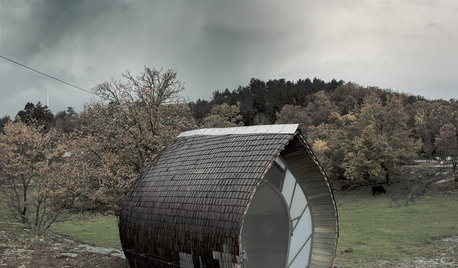Pneumonia Home Remedies
scarletdaisies
13 years ago
Related Stories

DECORATING GUIDESSmart Solutions for Nonexistent Entryways
Barely enough space to hang your hat? Front door swings past your living room couch? These remedies are for you
Full Story
GARDENING AND LANDSCAPINGTake Back Your Front Yard: 8 Ways to Make It Social
If only trees and squirrels gather in your front yard, you're missing out on valuable socializing space. Here's how to remedy that
Full Story
HOUZZ TOURSHouzz Tour: A Rare Tiny-Home Specimen in Sweden
With a reptilian skin and unusual architecture, this small home focuses on nature and simple living
Full Story
HOUZZ TOURSHouzz Tour: Farmhouse Style With an Unusual Inspiration
Comfort and sophistication are no surprise inside this Colorado home, but the exterior has an unexpected backstory
Full Story
CONTEMPORARY HOMESHouzz Tour: A Bark-Covered Floating Getaway on Lake Union
If the unusual siding doesn’t clue you in to the fine craftsmanship in this floating home, the handmade handrails, lights and furniture will
Full Story
HOMES AROUND THE WORLDHouzz Tour: An Island Vacation House in New Zealand
The dreams of a courageous couple become reality in a home where family and friends come together
Full Story
ARCHITECTUREModern or Contemporary Architecture? The Interiors Edition
See how one expert distinguishes between two popular camps of interior architecture. Do you agree with his choices?
Full Story
CONTEMPORARY HOMESHouzz Tour: Artful Architecture in the Heart of Paris
A contemporary 3-level house finds its place in the Parisian urban landscape
Full Story
HOUSEKEEPINGHow to Relax and Put Housework in Its Place
If household disarray is making you stressed and unhappy, try approaching it with a different point of view
Full Story
LIFEAnatomy of a Family-Size Mess
Study your home’s dumping grounds to figure out what organizational systems will work — then let yourself experiment
Full StoryMore Discussions






theherbalist
eibren
Related Professionals
Ashburn Landscape Architects & Landscape Designers · Forest Acres Landscape Architects & Landscape Designers · Manchester Landscape Contractors · East Patchogue Landscape Contractors · Fort Myers Landscape Contractors · La Vista Landscape Contractors · Longview Landscape Contractors · Lyndhurst Landscape Contractors · San Carlos Park Landscape Contractors · Daly City Carpenters · Mokena Carpenters · Whitney Carpenters · Edison Roofing & Gutters · Thousand Oaks Roofing & Gutters · Wheaton Roofing & Gutterseibren